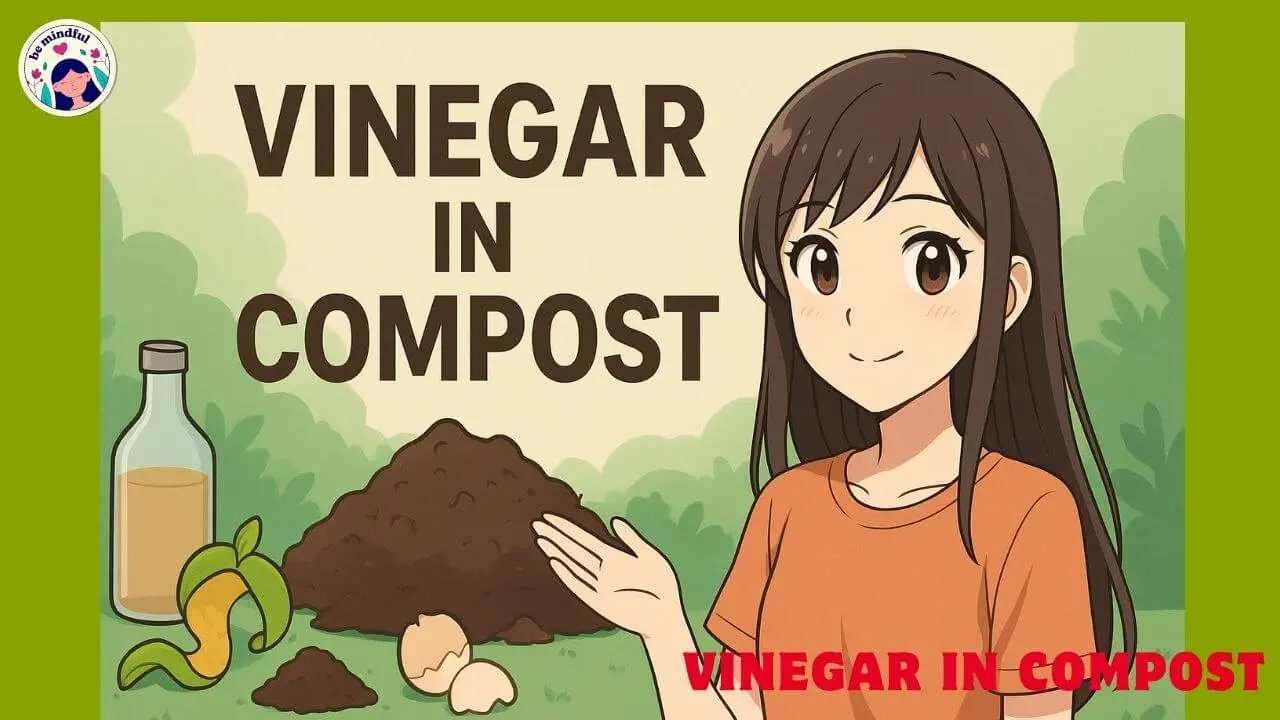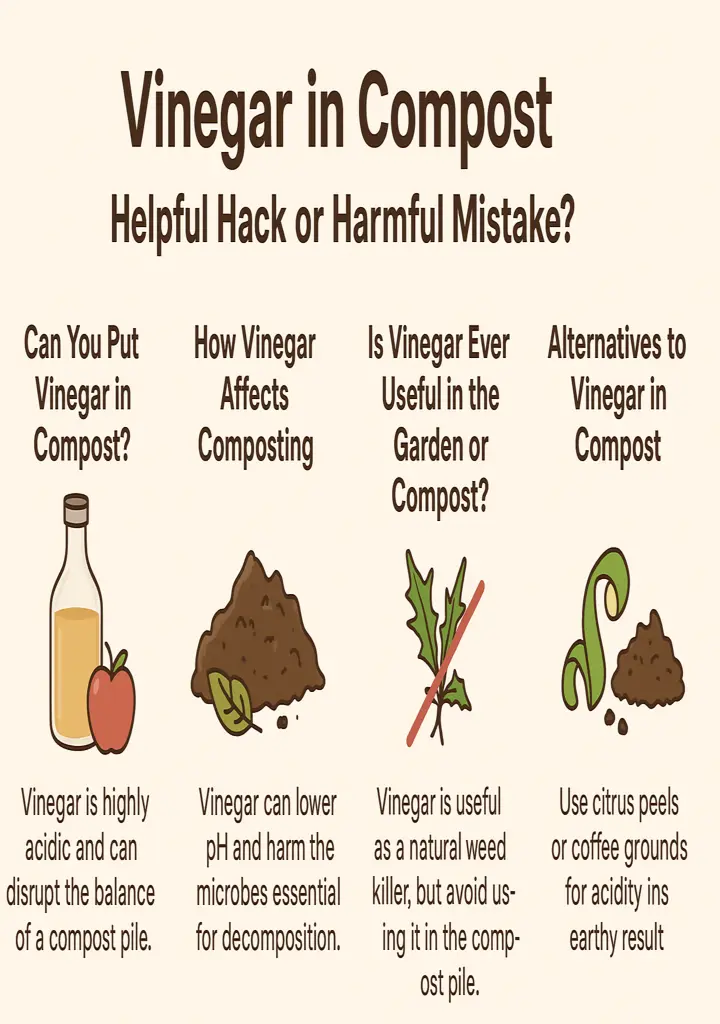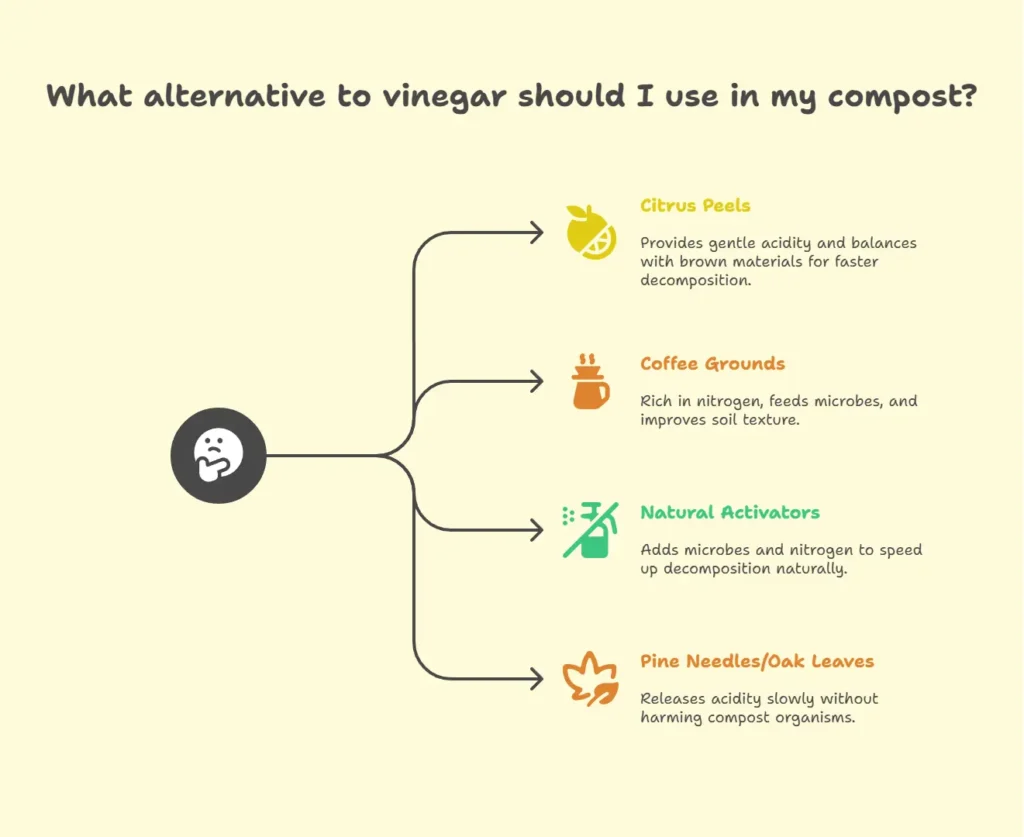
Vinegar in Compost: Helpful Hack or Harmful Mistake?
Composting is a simple way to recycle kitchen scraps and garden waste into rich, healthy soil. But when it comes to ingredients like vinegar, many gardeners ask: Is it safe to add vinegar to compost? While small traces from food scraps won’t cause major issues, pouring raw vinegar directly into compost can harm the balance. Let’s break it down step by step.
Can You Put Vinegar in Compost?
Before adding vinegar in compost, it’s important to understand how it affects the natural ecosystem inside your pile. Composting relies on bacteria, fungi, and worms to break materials down into humus.
Why Vinegar Can Be a Problem
Vinegar is acidic, usually with a pH of around 2 to 3. Compost, however, works best when it stays close to neutral (pH 6 to 7). Adding pure vinegar directly can make the pile too acidic. Also, it can discourage microbial activity and slow decomposition.
Common Compost-Friendly Kitchen Scraps
Instead of pouring vinegar, focus on safe, beneficial scraps like:
- Vegetable peels and fruit scraps
- Coffee grounds and tea bags
- Shredded newspaper or cardboard
- Crushed eggshells
- Yard clippings and dried leaves
These materials feed beneficial microbes and maintain balance. Vinegar doesn’t offer much nutrition for compost. On the other hand, it can harm compost worms if too concentrated.
How Vinegar Affects Composting
Adding vinegar has a direct effect on the microbial environment of your compost. A thriving pile needs oxygen, moisture, and balanced ingredients, not heavy doses of acidity.
Impact on Compost pH
A stable compost pile has a pH near neutral. Too much acidity stalls decomposition, produces unpleasant smells, and results in unfinished compost. Vinegar directly lowers pH, making conditions less ideal for microbes.
Effect on Microbes and Worms
The living organisms in compost, like bacteria, fungi, actinomycetes, and red wigglers, are sensitive to sudden pH changes. Vinegar can burn worms and reduce microbial populations, meaning slower breakdown of organic matter.
Apple Cider vs. White Vinegar vs. Cleaning Vinegar
- Apple cider vinegar is slightly less acidic, but still not recommended in raw form.
- White distilled vinegar is harsher and can easily disrupt composting.
- Cleaning vinegar (6% acidity or higher) is too strong and should never be used.
Is Vinegar Ever Useful in the Garden or Compost?
While vinegar isn’t ideal for compost piles, it does have practical uses around the garden. Also, it has importance in compost management when handled correctly.
Vinegar as a Natural Weed Killer
Spraying vinegar on weeds between paving stones or along pathways can control unwanted growth. However, avoid spraying it near your compost or soil you want to enrich, as it harms plants too.
Cleaning Compost Bins and Tools
Diluted vinegar (mixed with water) makes an excellent natural cleaner for compost bins, tumblers, and garden tools. It reduces odor, removes residue, and discourages pests without the need for harsh chemicals.
Small Uses in Specialized Composting
In Bokashi composting, which thrives on acidic conditions, tiny amounts of vinegar may play a role. Gardeners who grow acid-loving plants like blueberries, azaleas, or hydrangeas may add mild acids, but these must stay controlled and balanced.
Alternatives to Vinegar in Compost
If your goal is to maintain healthy decomposition or add mild acidity, there are better, compost-safe options than vinegar.
Citrus Peels
Orange, lemon, or lime peels provide gentle acidity. Chop them into smaller pieces so they break down faster and balance them with plenty of “brown” materials like dry leaves or shredded paper.
Coffee Grounds
Used coffee grounds are rich in nitrogen and slightly acidic. They are one of the best additions to compost. Also, they feed beneficial microbes and improve soil texture once finished.
Natural Compost Activators
Instead of vinegar, try proven compost boosters like:
- Fresh grass clippings
- Aged manure
- Commercial compost starter
- Finished compost as an inoculant
These materials add microbes and nitrogen that speed up decomposition naturally.
Pine Needles and Oak Leaves
For gardeners seeking more acidity, pine needles and oak leaves can be added in moderation. They release acidity slowly without harming compost organisms.
Best Practices for Healthy Compost
To avoid problems, you should maintain balance and consistency in your compost. A well-maintained pile breaks down efficiently into nutrient-rich humus that supports plant growth.
Balancing Greens and Browns
The rule of thumb is to maintain about 2 to 3 parts browns (carbon-rich) for every 1 part green (nitrogen-rich). Examples:
- Browns: dry leaves, shredded cardboard, straw
- Greens: fruit scraps, vegetable peels, coffee grounds
This balance ensures even decomposition and prevents odor issues.
Maintaining a Stable pH
If your compost becomes too acidic, add neutralizing materials like crushed eggshells, agricultural lime, or wood ash. These restore balance and encourage microbial activity.
Proper Aeration and Moisture
Turn your compost regularly to introduce oxygen. Keep it as moist as a wrung-out sponge; too wet leads to rot, too dry slows decomposition.
Adding Vinegar Indirectly
Instead of pouring vinegar directly, let it enter the pile naturally through food scraps that may contain traces. This way, the concentration is low enough not to disrupt microbes.
Vinegar Compost Add for Fruit Trees
Fruit trees do best with rich, balanced compost that feeds the soil and supports strong roots. A direct vinegar compost add is not a good idea because too much acid lowers soil pH and can stress the trees.
Instead, you should use compost made from kitchen scraps, dry leaves, and coffee grounds to provide steady nutrients. For acid-loving fruit trees, small amounts of citrus peels or coffee grounds help adjust pH gradually without harming soil life.
For more ideas on keeping fruit trees healthy, check out this quick guide on the best fertilizers for fruit trees
. It gives clear tips that any gardener can use.
Final Verdict: Should You Add Vinegar to Compost?
The bottom line: vinegar compost is not a recommended compost ingredient. Small amounts from leftover food are harmless, but pouring vinegar directly will disrupt microbes, worms, and the balance of your pile.
Safer Alternatives to Vinegar in Compost
- Stick with fruit and vegetable scraps
- Use coffee grounds or citrus for slight acidity
- Add manure, grass, or compost starter to accelerate breakdown
- Maintain pH balance with natural amendments
Healthy compost comes from balance, not shortcuts. By avoiding direct vinegar use and focusing on proven compost ingredients, you’ll end up with rich, dark humus that improves soil health naturally.
FAQs
Can I add apple cider vinegar to compost?
Yes. Small traces from leftover food are acceptable. Avoid direct pouring of apple cider vinegar. Large amounts reduce compost quality by lowering pH too much.
Does vinegar kill compost worms?
Yes. Concentrated vinegar harms red wigglers and other compost worms by creating an overly acidic environment. A balanced pile keeps worms active and supports proper compost formation.
Is vinegar safe for compost tea?
No. Vinegar lowers pH and reduces helpful microbial activity in compost tea. Choose molasses or worm castings to promote a strong, balanced mix of beneficial organisms.
Can You Put Pickles in Compost?
Small amounts of pickles can be added, but with caution. Pickles contain vinegar, salt, and sometimes preservatives that can harm microbes and slow decomposition if added in large quantities.
What’s the best way to fix acidic compost?
Add dry leaves, shredded cardboard, crushed eggshells, or garden lime to raise pH. Turn the pile to distribute the materials evenly and support a neutral, earthy result.
borshon96
Recommended

9 Effective Tips for Balcony Gardens for Beginners

Best Homemade Fertilizer: Banana Peel for Plants


Philodendron Neon Heartleaf: Your Most Obedient Houseplant



